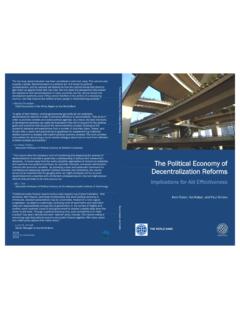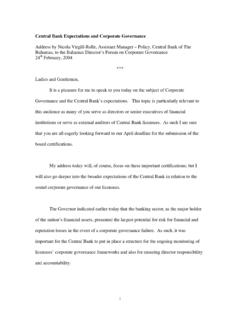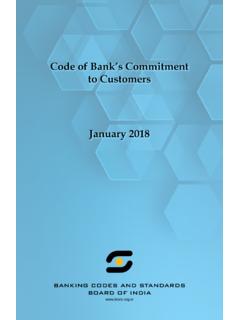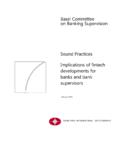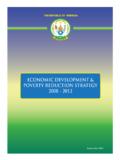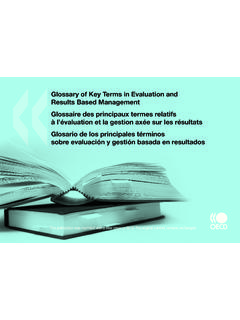Transcription of Budgeting - World Bank
1 BudgetingThis brief is one in a series of tips for civil society organizations written from a funder s is intended to stimulate inquiry, rather than to provide rigid instructions. T i ps f o r St r e ngt he ni ng Or ga ni z a t i o na l Ca pa c i t yBudgetingTips for preparing a budget with an emphasis on: p u r p o s e o f a b u d g e t , preparing your budget, budget components, and creating a DevelopmentTips for developing and implementing a project and key questions to ask in the Systems Tips for establishing an accountable and transparent financial system to build financial & EvaluationTi p s f o r r e v i e w i n g a n d assessing progress towards objectives, identifying problems and strategies.
2 And making adjustments to MobilizationTips for mobilizing resources closer to home to strengthen organizational capacity and d e l i v e r b e n e fi t s t o t h e Proposal WritingTips for developing and writing a proposal, including critical elements to facilitate project success. Reporting to FundersTips for maintaining and strengthening your relationship with funders following a grant award. PURPOSE OF A BUDGETA budget is a key management tool for planning, monitoring, and controlling the finances of a project or organization.
3 It estimates the income and expenditures for a set period of time for your project or budget can serve a number of important purposes, including: Monitoring the income and expenditures over the course of a year (or a specific project time frame) Helping to determine if adjustments need to be made in programs and goals Forecasting income and expenses for projects, including the timing and the availability of income (such as additional grant funds) Providing a basis for accountability and funders, a budget is also an essential tool and provides an understanding of your work.
4 Funders view budgets to consider the following: How are you planning to use the grant funds? What are the other sources of funds for the work? Does the budget reflect local costs? Do the expenditures correspond to the activities? Does the budget fall within the guidelines of what the funder can support? What percentage of overhead expenses (such as salaries, rent, utilities) is included in the budget? PREPARING YOUR BUDGETWho should be involved in the process of preparing a budget? Program and financial staff should work together to formulate a budget since budgets are based on objectives, action plans, and resources.
5 Once a draft is in place, seeking input from your governing body (such as the board of directors or general assembly) is important. This input gives you an opportunity to develop a clear rationale for your budget, helps you identify if any budget items or expenses have been omitted, and draws on the board s expertise. By collaborating with financial staff, program staff, and your board, you can develop a budget that reflects priorities for the entire organization, helping to build unity in your sense of key questions need to be addressed?
6 Building on your planning process, you need to consider the following questions in preparation of creating your budget: What resources will be required to achieve your planned goals? Where will the funds come from? How will you raise the funds? How can your organization make use of in-kind or donated services?What external factors need to be considered?External influences that are not in your control may have an impact on the success of your efforts. Having alternate plans or rethinking your strategies should be a part of your planning.
7 Some external influences that can affect your financial planning include (examples in parenthesis): World bank SMALL GRANTS PROGRAM 1 Government or national policies and legislations (the Poverty Reduction Strategy that may affect the way governments address poverty) Natural disasters or epidemics (drought that affects the people you are working with) Political conditions (elections that may disrupt daily life or cause instability) Global economic forces (changes in global market prices for the commodity that farmers are producing)
8 Local socio-economic factors (increase in price of fuel affecting your mobility) Availability of donor funds and resources (changes in funding priorities of funders)When should you create your budget?Begin convening financial and program staff several months before the start of your financial (fiscal) year. This should allow enough time for your group to address the question s above and draft a budget that can be reviewed by your governing board. For a budget that involves a new initiative, additional planning time may be required to develop your action plan and to determine if adequate resources can be raised to implement the project.
9 BUDGET COMPONENTSB elow are areas to consider when preparing your budget:Income: Funders like to see a diverse source of revenue which shows that sustainability does not rely on one sole source of funding. The income could include product sales, government contracts, foundation grants, and individual contributions. In some cases, organizations may not have an income to report. Expenses: Expenses should be itemized and include unit costs, for example, daily fees or travel for number of Headings: Make sure that the same budget headings or categories are consistent throughout the organization, for both income and expense items.
10 This will simplify your bookkeeping and help with reporting and financial reviews. Headings may include: staff salaries, rent, utilities, telephones, equipment, insurance, fuel, travel, fees for expert consultants, etc. Currency: Be sure to note what currency and exchange rate you are using when presenting your budget to a funder. Some may require you to convert your currency in to the US dollars or other : Keep notes to record the Budgeting process. Notes explain how and why budget calculations are made.








